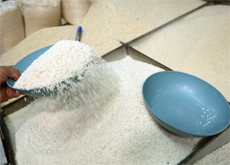FROM THE ECONOMIST INTELLIGENCE UNIT
Global food shortages, which have resulted in soaring food prices and riots in some Middle Eastern states have forced regional governments to think laterally for a solution. Many governments quickly resorted to time-worn measures, like extending subsidies and raising salaries, but almost as quickly realised that they must look beyond traditional short-term remedies focused on consumer protection, to more long-term strategic plans in order to help stabilise prices and secure supply.
Starved of proper investment, agriculture throughout the Middle East and North Africa (MENA) region has developed little and remains generally small-scale and inefficient. Attempts at large projects have more often than not resulted in a huge waste of resources. Libya’s Great Man-made River project, designed to irrigate huge swathes of arable land to enable the country to become self-sufficient in food, has proved a monumental white elephant, while Saudi Arabia, after having poured billions into the cultivation of wheat has finally given up on the idea, realising that it was far too expensive and, more importantly, used up far too much water, for cultivation to continue.
Consequently, the region remains dependent on imported food. And, as a corollary, it has been affected more than most by inflated global commodity prices. This has been exacerbated by increasing regional demand within the Gulf in particular, on the back of a rapidly rising immigrant population. The six member states of the Gulf Co-operation Council (GCC) are estimated to have spent US$10bn on the importation of foodstuffs in 2007, a figure that is projected to rise by up to 40% in 2008. Since 2000, MENA’s food import bill has surged by over 150%.
Land grab
Consequently, governments around MENA are now looking to secure their own sources of food supply. In mid-May, the Saudi government announced that it would co-ordinate with local private-sector companies and invest in strategic agricultural interests in key producer countries such as Brazil, Ukraine, Thailand and India, guaranteeing for itself supplies of cereals, meat and vegetables. It is already in advanced negotiations with Thai investors and a deal on rice farms in Thailand is likely before the end of the year.
Similarly, the United Arab Emirates is also considering purchasing large-scale farms in Pakistan, in concert with Abraaj Capital, a private equity company. While the government has been in extensive discussions with the Pakistani leadership over a framework for long-term agricultural investment, Abraaj has been buying up tracts of land throughout Pakistan, having acquired, in league with the government and other private funds, up to 800,000 acres in the past year. The emirate of Abu Dhabi has purchased over 70,000 acres of arable land in Sudan, while Libya has signed deals to develop large tracts of agricultural holdings in Ukraine.
These measures will undoubtedly inject greater economic efficiency into the region’s food-supply chain. But there are inherent risks associated with such a strategy. Should political tensions arise within producer states, overseas owners of domestic production assets are likely to be an early target of domestic resentment. Nor will MENA states be able to protect their own outsourced farming projects as well as they may be able to protect domestic agricultural production. Furthermore, national investors will have to ensure that the producer states’ markets are well supplied before shipping produce back home. In addition, Gulf states are already in competition for prime agricultural land with China. Under its “go outward” strategy, China has been leasing overseas farmland since 1996, but has stepped up its acquisitive activities in recent years as global food prices have started to rise.
Doha death knell
These policies have inevitably raised concerns over market distortion, most notably from the US and the EU. While these two actors have little grounds for complaint, on account of their own agricultural subsidy programmes, there is a growing belief that such outsourcing policies may further complicate the international trade regime. In particular, it may ultimately signal the death of the Doha Development Round, which was predicated on the opening of agricultural markets. But MENA countries, and in particular, Gulf states, will not be overly perturbed by this. Faced with potential unrest, they will persist in pursuing policies which will ensure sufficient bread at affordable prices for all their citizens.












